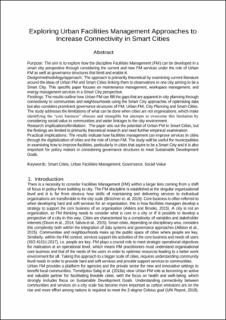| dc.contributor.author | Lindkvist, Carmel Margaret | |
| dc.contributor.author | Temeljotov Salaj, Alenka | |
| dc.contributor.author | Collins, David | |
| dc.contributor.author | Bjørberg, Svein | |
| dc.contributor.author | Haugen, Tore | |
| dc.date.accessioned | 2020-10-19T08:45:16Z | |
| dc.date.available | 2020-10-19T08:45:16Z | |
| dc.date.created | 2020-10-06T16:01:11Z | |
| dc.date.issued | 2020 | |
| dc.identifier.citation | Facilities. 2020, 38 . | en_US |
| dc.identifier.issn | 0263-2772 | |
| dc.identifier.uri | https://hdl.handle.net/11250/2683542 | |
| dc.description.abstract | Purpose The purpose of this study is to explore how the discipline facilities management (FM) can be developed in a smart city perspective through considering the current and new FM services under the role of Urban FM, as well as governance structures that limit and enable it. Design/methodology/approach The approach is primarily theoretical by examining current literature around the ideas of Urban FM and Smart Cities linking them to observations in one city aiming to be a Smart City. This specific paper focusses on maintenance management, workspace management and energy management services in a Smart City perspective. Findings The results outline how Urban FM can fill the gaps that are apparent in city planning through connectivity to communities and neighbourhoods using the Smart City not only approaches of optimising data but also considers prominent governance structures of FM, Urban FM, City Planning and Smart Cities. The study addresses the limitations of what can be done when cities are not organisations, which make identifying the “core business” obscure and intangible but attempts to overcome this limitation by considering social value in communities and wider linkages to the city environment. Research limitations/implications The paper sets out the potential of Urban FM in Smart Cities, but the findings are limited to primarily theoretical research and need further empirical examination. Practical implications The results indicate how facilities management can improve services in cities through the digitalisation of cities and the role of Urban FM. The study will be useful for municipalities in examining how to improve facilities, particularly in cities that aspire to be a Smart City and it is also important for policymakers in considering governance structures to meet sustainable development goals. Originality/value The study positions the discipline of facilities management in Smart Cities which has the potential to improve facilities in cities and the development of Urban FM. | en_US |
| dc.language.iso | eng | en_US |
| dc.publisher | Emerald | en_US |
| dc.title | Exploring urban facilities management approaches to increase connectivity in smart cities | en_US |
| dc.type | Peer reviewed | en_US |
| dc.type | Journal article | en_US |
| dc.description.version | acceptedVersion | en_US |
| dc.source.pagenumber | 17 | en_US |
| dc.source.volume | 38 | en_US |
| dc.source.journal | Facilities | en_US |
| dc.identifier.doi | 10.1108/F-08-2019-0095 | |
| dc.identifier.cristin | 1837680 | |
| dc.description.localcode | © 2020. This is the authors' accepted and refereed manuscript to the article. The final authenticated version is available online at: http://dx.doi.org/10.1108/F-08-2019-0095 | en_US |
| cristin.ispublished | true | |
| cristin.fulltext | postprint | |
| cristin.qualitycode | 1 | |
